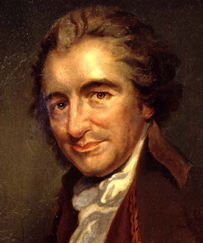
http://www.indiana.edu/~liblilly/history/images/jc178-b713_00001.jpg
Dissension Takes Root
Ÿ The 1763 British victory over the French meant that the French were finally kicked out of the American Colonies, leaving the fur trade only for the British.
Ÿ The high cost of a decade of fighting left the British nearly bankrupt so officials in London decided to make the colonists should pay the war debts.
Ÿ Economics wasn’t the only factor for the colonists to start a revolution, the contrast of ideas between the British and the colonists was also a big factor.
Ÿ The colonists wanted the citizens to make the laws not King George . They wanted to be in charge of the colonies themselves.
Sam Adams: Firebrand of the Revolution
Ÿ Sam Adams was the cousin of John Adams. Sam organized the Boston Tea Party. In the 1760s he wrote hundreds of essays and news article for the Boston Gazette. Other newspapers also printed his work helping spread his thoughts throughout the colonies.
Ÿ In 1764, Sam argued that the British Parliament was imposing too many taxes on the colonists. Sam insisted that the colonists’ liberty was in jeopardy. “ If our Trade may be taxed?” “Why not our Lands? Why not the produce of our Lands & every thing we possess or make use of? This we apprehend annihilates our Charter Rights to govern & tax ourselves.” Adams’s protests were against taxation without representation.
Ÿ Adams and other radicals believed that the only way the colonies could resolve their disputes with Britain was to secure home rule.
Ÿ They wanted the colonists to make their own laws not the British.
Ÿ “Where there is a Spark of patriotic fire, we will enkindle it.”
“Journal of Occurrences” as News Service
Ÿ Adams’s service the “Journal of Occurrences” quickly became a communication network that spread his anti-British rhetoric to every corner of the colonies. Articles and stories for the journal were written by Adams and other Boston agents before being reprinted in the 35 weekly newspapers being published in the colonies at the time. Adams and the other writers would send accounts of events to John Holt, publisher of the New York Journal , and Holt would print the events in the next edition.
Ÿ Adams’s impetus to establish the news service was Britain’s decision to send a large numbers of troops to Boston, because they were concerned that they were losing control of the colonies. The British concern rised when the number of protest over tax initiatives also rised.
Ÿ The British sent four regiments of soldiers to Boston to maintain order and to remind the colonist that they were ruled by Britain.
Ÿ The “Journal of Occurrences” began in September 1768, the same month the British troops arrived.
Ÿ Adams’s published all the brutal attacks of the British against the colonists. Some of these acts were rape, burglary, and beating colonists.
Boston Massacre: Not to Be Forgotten
Ÿ During the summer of 1769 British officials withdrew four regiments of militiamen from the streets of Boston, but they still left a few guards roaming the streets. The presence of these guards angered the colonists, and they decided to do something about it. On March 5, 1770 a few young colonists started throwing snowballs at the guards outside the British Custom House. What some colonists and these youngsters may have considered a childish and funny prank it escalated into something deadly for them. After they stopped throwing the snowballs one of the colonist boys hit one of the guards. One of these strikes knocked a soldier to the floor provoking him to fire his musket and the bullet struck a colonist. Then a huge fight broke out with colonist swinging clubs and the British firing their guns. After everything cleared up five colonists were dead. Colonial newspapers made this known to everyone as the Boston Massacre.
Tom Paine: Voice of Inspiration
Ÿ The Writer of the pamphlet Common Sense Thomas Paine was a voice of inspiration for the colonist. This pamphlet encouraged and inspired all the Patriots to fight for their rights and independence. Thomas Paine had to convince colonists, because most patriots advised him not to mention independence because they weren't thinking of going to war. Paine wrote in Common Sense that if colonists gained their independence it would be the start to a new world.
Common Sense Ignites a Nation
Ÿ More than 150,000 copies of Common Sense were sold and by the end of one year 25 editions of the pamphlet were made. This pamphlet was read in coffeehouses, taverns, and town squares throughout the colonist encouraging the colonists even more to fight for their independence. Thomas Paine's words were now describing the feelings of all the colonist it was like if he was The Voice of the colonist expressing his wrath to King George.
Crisis Essays Inspire an Army
Ÿ Paine joined the Continental Army in August 1776. Him and his fellow soldiers felt the might of a much bigger and well trained British Army . The British defeated the Americans in many battles.
Ÿ The Winter, poor food, and inadequate uniforms began to have a negative effect on the soldiers.
Ÿ General Washington asked Paine to write a motivational essay to encourage the soldiers to keep on fighting.
Ÿ In December 1776, the first Crisis papers were printed in the Pennsylvania Journal.
Ÿ George Washington read the papers to his soldiers and a week later they won a crucial battle at Trenton.
Stunning Impact
Ÿ The American Revolution was the first event in American History in which journalism had a huge impact on. News has helped shaped American History. Sam Adams’s “Journal of Occurrences” and Thomas Paine’s Common Sense were a big help in motivating colonist fight and gain their independence from the British.





No comments:
Post a Comment